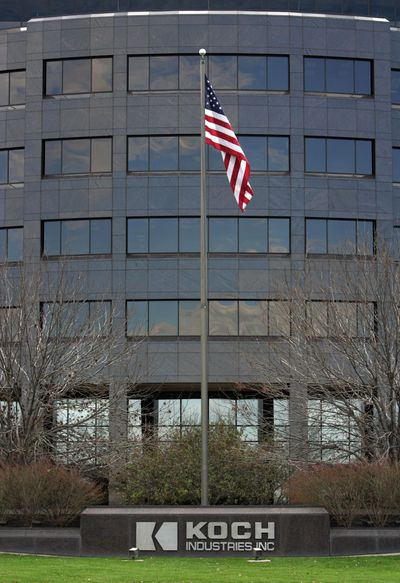Billionaire Koch brothers are major players in GOP
House energy panel indicative of clout

WASHINGTON – The billionaire brothers David and Charles Koch no longer sit outside Washington’s political establishment, isolated by their uncompromising conservatism. Instead, they are now at the center of Republican power, a change most evident in the new makeup of the House Energy and Commerce Committee.
Wichita-based Koch Industries and its employees formed the largest single oil and gas donor to members of the panel, ahead of giants like Exxon Mobil, contributing $279,500 to 22 of the committee’s 31 Republicans, and $32,000 to five Democrats.
Nine of the 12 new Republicans on the panel signed a pledge distributed by a Koch-founded advocacy group – Americans for Prosperity – to oppose the Obama administration’s proposal to regulate greenhouse gases. Of the six GOP freshman lawmakers on the panel, five benefited from the group’s separate advertising and grass-roots activity during the 2010 campaign.
Claiming an electoral mandate, Republicans on the committee have launched an agenda of the sort long backed by the Koch brothers. A top early goal: restricting the reach of the Environmental Protection Agency, which oversees the Kochs’ core energy businesses.
The new committee members include a congressman who has hired a former Koch Industries lawyer as his chief of staff. Another, Rep. Morgan Griffith of Virginia, won a long-shot bid to unseat a 14-term moderate Democrat with help from Americans for Prosperity, which marshaled conservative activists in his district. By some estimates, the advocacy group spent more than a quarter-million dollars on negative ads in the campaign.
Perhaps the Kochs’ most surprising and important ally on the committee is its new chairman, Rep. Fred Upton. The Republican from Michigan, who was once criticized by conservatives for his middle-of-the-road approach to environmental issues, is now leading the effort to rein in the EPA.
Upton received $20,000 in donations from Koch employees in 2010, making them among his top 10 donors in that cycle, according to the Center for Responsive Politics.
In recent months the congressman has made a point of publicly aligning himself with the Koch-backed advocacy group, calling for an end to the “EPA chokehold.” Last week the chairman released a draft of a bill that would strip the EPA of its ability to curb carbon emissions. The legislation is in line with the Kochs’ long-advocated stance that the federal government should have a minimal role in regulating business. The Kochs’ oil refineries and chemical plants stand to pay millions to reduce air pollution under currently proposed EPA regulations.
Koch Industries is the country’s second-largest privately run company, a conglomerate of refining, pipeline, chemical and paper businesses. Their products include Lycra and Coolmax fibers, Brawny paper towels and Stainmaster carpets. Last year, Forbes magazine listed the brothers as the nation’s fifth-richest people, each worth $21.5 billion.
A spokesman for the famously media-shy family declined to comment. Koch allies say the brothers act out of ideological conviction.
The Kochs have not always been close to the Republican hub. The brothers were known as hard-liners unafraid to take on conservative icons – even President Ronald Reagan and the American Petroleum Institute – whom they occasionally perceived to be too accommodating to liberal interests. David Koch ran as the Libertarian Party’s vice presidential candidate in 1980, when Reagan was the GOP presidential candidate.
The Kochs provided initial funding for the libertarian Cato Institute and are key donors to the Federalist Society, among other conservative organizations.
In recent years, they began drawing conservative media, business and political leaders to semiannual meetings in the West to discuss protection of the free-market ethos and to raise funds for their causes. The most recent was in Rancho Mirage, Calif., a week ago.
Frustrated with the state of conservatism in Washington during the George W. Bush era, the Kochs began to shift the discussions at recent meetings from fundraising for think tanks to more specific electoral strategy.
At the center of the new ground-level strategy is a beefed-up role for Americans for Prosperity. Along with other well-funded conservative groups, the group was very active in the congressional midterm election – in many cases taking on roles often performed by national and state parties.
Americans for Prosperity is the political arm of the Americans for Prosperity Foundation, which David Koch co-founded in the 1980s under the name Citizens for a Sound Economy. He is chairman of the board of the foundation, which says it aims to educate citizens on “a return of the federal government to its constitutional limits.”
Americans for Prosperity says it spent $40 million in the 2010 election cycle, organized rallies and phone banks, and canvassed door to door in nearly 100 races across the country. The organization found scores of energetic activists in the tea party movement to carry its message.
Throughout this effort, Americans for Prosperity kept a strong emphasis on promoting its views on climate change and energy regulation. In 2008, AFP began circulating a pledge asking politicians to denounce a Democratic-led effort to compel oil refineries and utilities to clean up emissions of greenhouse gases through a so-called cap-and-trade system. AFP said it amounted to a hidden tax increase.